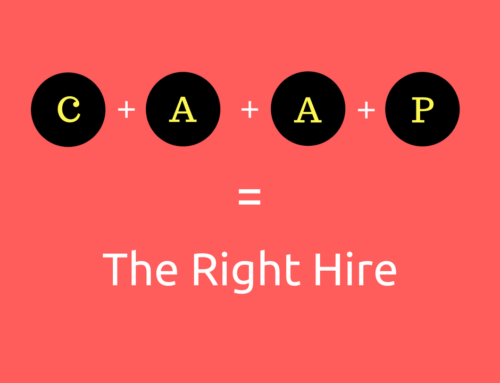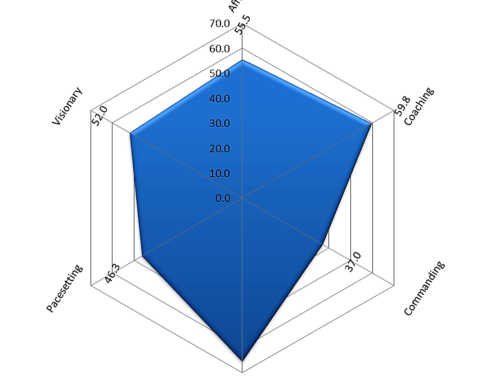So far we have covered Culture, Attitude and Aptitude in our previous articles. The final piece of the CAAP® Foundation is PERSONALITY.
If you missed the previous articles, read them here: Culture, Attitude, Aptitude
So what is Personality and why is it so important?
According to Peter Gray, a professor of psychology with the Boston College, PERSONALITY “refers to a person’s general style of interacting with the world, especially with other people – whether one is withdrawn or outgoing, excitable or placid, conscientious or careless, kind or stern.???
Personality is important because it is what governs your behavior and how you react to others around you. It governs how you work within a team, how you communicate, how you lead others, how you make decisions and how you manage change.
Personality is a critical aspect of a candidate you are hiring. The common mistake in hiring is that most hiring managers focus too much on a candidate’s “hard??? skills and experience, and overlook Personality.
The Big Five
In the early 1980’s, psychologists came up with a framework consisting of five domains to describe various personalities. They called it the Big Five.
The Big Five consists of five domains. They are:
- Extraversion (E),
- Agreeableness (A),
- Conscientiousness (C),
- Neuroticism (N), and
- Openness to Experience (O).
The Big Five became the foundation for assessing individual differences in the ways people interact with their social and physical worlds.
The first three domains – Extraversion, Agreeableness, and Neuroticism – mainly relate to ways of interacting with other people, whereas the other two domains – Conscientiousness and Openness – are more general.
The following provides a brief description of the five domains.
Extraversion
Someone who is high on Extraversion would be seen as outgoing, talkative and energetic. Extraverts enjoy being the center of attention. They have a tendency to be happy, upbeat and fun-loving individuals.
In contrast, people who are low in extraversion (introversion) tend to be withdrawn, quiet, and reserved. They tend to be less interested in interpersonal interactions and have a tendency to avoid people and crowds.
Agreeableness
People high on Agreeableness are usually kind, compassionate, helpful and generous. They truly like people and they normally get along well with most people.
Those with low Agreeableness (Antagonism) tend to be seen as cold, uncaring, uncooperative, and stingy. These people tend to be more self-focused and disrespectful of the rights of others.
Conscientiousness
People high in Conscientiousness are usually neat, tidy, organized and reliable. They are also usually hardworking and punctual. They also like to plan ahead.
In contrast, people low in Conscientiousness (Carelessness) are usually more spontaneous, disorganized and less constrained.
Neuroticism
People high in Neuroticism are usually emotionally unstable, volatile, easily upset by minor threats or frustrations, and are usually in a foul mood. They are discontented and experience low satisfaction with life and with the things around them. They are more prone to anxiety, depression and self-doubt.
People who are low on Neuroticism are emotionally stable (Emotional Stability), calm, composed and generally happy and satisfied with life.
Openness to Experience
People who are high on Openness are normally curious, imaginative and enjoy the arts. They also tend to be non-conforming and are comfortable with new ideas. They are also more aware of their feelings.
People who are low on Openness tend to be unimaginative, conforming and conservative. They also tend to be conventional and resistant to change.
What makes the Big Five so useful is that it is clear, concise and simple to use. In fact, just by reading the traits indicated above will probably cause you to instantly think of some people you already know.
For instance, who comes to mind as you read the words Outgoing, Talkative, Assertive? And who comes to mind as you read the words Tense, Unstable, Irritable, and Insecure?
Personality style is important because it influences the type of work one enjoys and the type of people one likes to associate with. Staffing the team with people possessing the appropriate and complementary personality attributes will determine if your team succeeds or fails.
Personality style is important because it influences the type of work one enjoys and the type of people one likes to associate with
Personality Types You Should Hire
Am I suggesting that you staff your team with people with the same personalities?
No, absolutely not. Staffing your team with people possessing the same types of personalities puts your team in danger of “Group Think”. What I’m saying is that you should try to avoid the extremes.
Take for instance, Neuroticism. What you don’t want is a personality that is very high on Neuroticism — someone who screams and shouts at the slightest provocation; or someone who vents her anger at the people around. Instead you would want those who are emotionally more stable, calm and collected to be on your team and to work closely with you.
Similarly, you would want those who have a healthy dose of Agreeableness because they are usually kind, compassionate, helpful and generous, and they normally get along well with most people.
Whatever the case may be, the personality types that you pick should very much depend on the culture of your organization and your team.
If your organization values personalities that are introverted, quiet, and analytical, then hiring someone who is high on extraversion or neuroticism might upset the balance – unless of course, that person has the Aptitude to adapt to the culture of the organization.
Personality Assessment
If you are interested in taking a free personality self-assessment based on the Big Five, go to http://www.personal.psu.edu/j5j/IPIP/.
The Big Five is just one of the many personality instruments available in the market today. The more popular ones that have been adopted and used by many organizations around the world include DISC® and MBTI®.
These instruments are also very useful in helping you understand personality types you have in your team or organization, however they should never be used as part of the hiring process to determine which candidates you should hire.
The reasons are because these personality instruments are primarily self-assessments, which implies that it requires a healthy dose of self-awareness and honesty in order to generate an accurate self-portrait; and these self-assessments are quite transparent meaning that if a person wants to present himself as a particular type of personality can usually easily do so.
Share this article with your friends and colleagues!
Learn how to hire the right people every time, avoid the mistakes most interviewers make, maximise employee engagement levels, lead and manage your employees to peak performance, minimise attrition rate, and so much more…
PLUS: Receive a free sample chapter on How to Craft Effective Interview Questions from my yet-to-be-released book How to Hire the Right People Every Time: The Executive’s Guide to Getting It Right
Get your weekly tips now. Join us here.








Leave A Comment